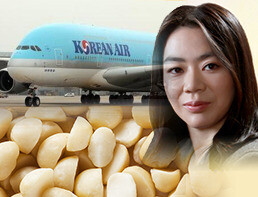hankyoreh
Links to other country sites 다른 나라 사이트 링크
[Reporter’s notebook] Korean Air princess is just the tip of the abusive chaebol iceberg

Is it just Cho Hyun-ah?
In the wake of the Korean Air vice president’s resignation from several positions over an incident when she turned around an international flight over improperly presented macadamia nuts, many are now saying the real issue goes beyond her to other members of the Hanjin Group‘s ruling Cho clan. People close to the group say the most high-profile examples - including a 2005 incident when Cho’s younger brother Won-tae was booked for pushing over a woman in her seventies over a road dispute, or a 2012 episode when he verbally abused a civic group protesting over the management of Inha University - represent just the tip of the iceberg.
“I don’t think there’s a single one of the executives, including me, who hasn‘t been heaped with abuse after being called on the carpet by [Hanjin Group chairman] Cho Yang-ho’s wife,” recalled a former executive with a shake of the head.
Another former executive said a lot of the employees “are relieved that this finally blew up the way it did, although they’ll never say so publicly.”
The issue of tyrannical behavior by chaebol families extends beyond Hanjin. The chairman of one of the top ten groups, identified by the initial “P,” is well-known throughout the business world for his anger management issues and abusive language.
“There was one time where the chairman saw an executive at an internal talk who had been boozing the night before and was chewing gum to get rid of the smell,” recalled one executive at the group. “He shouted, ‘Get out of here,’ and fired them on the spot. He also famously fired an employee who was on the elevator with him because he smelled like cigarettes.”
Another major shareholder at one of the top ten groups, identified by the initial “J,” is known not just for abusive language, but also for kicking employees in the shin when angry.
“I was once invited to an event by J, and I was shocked at the borderline abusive language he used with a much older executive,” recalled one prominent journalist. The use of abusive language with the elderly is typically seen as taboo in age-conscious South Korean culture.
Samwhan Corporation CEO Choi Yong-kwon, a onetime member of the Federation of Korean Industries presidential board, is especially notorious for his chronic abusive language and behavior with executives over the past decades.
Shin-kicking was also a common practice for Hyundai Group founder Chung Ju-yung in the early economic development days of the 1960s and ’70s, when verbal and physical abuse by chaebol heads became seen as commonplace. But the situation is different four to five decades later, with the same companies having grown into global businesses. What explains the persistence of a backward, pre-modern corporate culture?
“There’s still the same mind-set that the owner is the master and the employees are servants,” said Inha University professor Kim Jin-bang. “Also, the second and third generation chaebol children are treated like little princes from the time they’re born.”
The argument is that the corporate scions are almost destined to become overbearing because of the untrammeled power the owners enjoy under the imperial management system - authority that then gets passed on to their children.
Many believe the time has come to leave those practices behind, not only for the company’s sake but for the clans themselves.
“The third chaebol generation ought to be humble enough that they wouldn’t choose to sit in first class because they think they deserve it,” grumbled one chaebol executive. It’s a message many of the family members could stand to take to heart - and perhaps even a way for a post-authoritarian, more horizontal organizational culture to blossom and a new DNA of creativity and innovation to take root.
By Kwak Jung-soo, business correspondent
Please direct questions or comments to [english@hani.co.kr]

Editorial・opinion
![[Column] Park Geun-hye déjà vu in Yoon Suk-yeol [Column] Park Geun-hye déjà vu in Yoon Suk-yeol](https://flexible.img.hani.co.kr/flexible/normal/500/300/imgdb/original/2024/0424/651713945113788.jpg) [Column] Park Geun-hye déjà vu in Yoon Suk-yeol
[Column] Park Geun-hye déjà vu in Yoon Suk-yeol![[Editorial] New weight of N. Korea’s nuclear threats makes dialogue all the more urgent [Editorial] New weight of N. Korea’s nuclear threats makes dialogue all the more urgent](https://flexible.img.hani.co.kr/flexible/normal/500/300/imgdb/original/2024/0424/7317139454662664.jpg) [Editorial] New weight of N. Korea’s nuclear threats makes dialogue all the more urgent
[Editorial] New weight of N. Korea’s nuclear threats makes dialogue all the more urgent- [Guest essay] The real reason Korea’s new right wants to dub Rhee a founding father
- [Column] ‘Choson’: Is it time we start referring to N. Korea in its own terms?
- [Editorial] Japan’s rewriting of history with Korea has gone too far
- [Column] The president’s questionable capacity for dialogue
- [Column] Are chaebol firms just pizza pies for families to divvy up as they please?
- [Column] Has Korea, too, crossed the Rubicon on China?
- [Correspondent’s column] In Japan’s alliance with US, echoes of its past alliances with UK
- [Editorial] Does Yoon think the Korean public is wrong?
Most viewed articles
- 1‘We must say no’: Seoul defense chief on Korean, USFK involvement in hypothetical Taiwan crisis
- 2N. Korean delegation’s trip to Iran shows how Pyongyang is leveraging ties with Moscow
- 346% of cases of violence against women in Korea perpetrated by intimate partner, study finds
- 4[Column] Park Geun-hye déjà vu in Yoon Suk-yeol
- 5‘Weddingflation’ breaks the bank for Korean couples-to-be
- 6Will NewJeans end up collateral damage in internal feud at K-pop juggernaut Hybe?
- 7Amnesty notes ‘erosion’ of freedom of expression in Korea in annual human rights report
- 8[Interview] Dear Korean men, It’s OK to admit you’re not always strong
- 9Korean government’s compromise plan for medical reform swiftly rejected by doctors
- 10[Editorial] Japan’s rewriting of history with Korea has gone too far